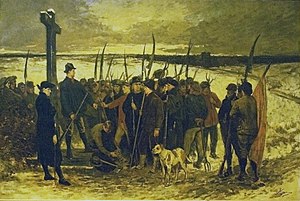Peasants' War (1798)
| Peasants' War | |||||||
|---|---|---|---|---|---|---|---|
| Part of the French Revolutionary Wars | |||||||
 Peasants gathering, Constantin Meunier (1875) |
|||||||
|
|||||||
| Belligerents | |||||||
|
|
|
||||||
| Commanders and leaders | |||||||
|
|
|
||||||
| Casualties and losses | |||||||
| In Flanders, c.15,000 dead In Luxembourg, 200–300 |
|||||||
The Peasants' War (French: Guerre des Paysans, Dutch: Boerenkrijg, German: Klöppelkrieg, Luxembourgish: Klëppelkrich) was a peasant revolt in 1798 against the French occupiers of the Southern Netherlands, a region which now includes Belgium, Luxembourg, and parts of Germany. The French had annexed the region in 1795 and control of the region was officially ceded to the French after the Treaty of Campo Formio in 1797. The revolt is considered part of the French Revolutionary Wars.
After the Southern Netherlands was annexed by France, the French Revolutionaries began to implement their policies regarding the Catholic Church. The Civil Constitution of the Clergy required that priests take an oath of allegiance to the state. Priests who refused such an oath were considered to be enemies—non-juring priests—of the state and could be removed from their positions and homes. Additionally, in early 1798 the French Council of Five Hundred passed a law requiring compulsory military service. This law ordered the conscription of men between the ages of 20 and 25 in all French territories. General conscription like this was a relatively new product of the French Revolution, and was met with anger by the young men who were forced into service.
The majority of the conflict during the Peasants' War occurred in Flanders (Lys and Scheldt départements) and Brabant (Deux-Nèthes and Dyle départements). Referred to as the Boerenkrijg, it is referenced by some historians as a Belgian national revolt, and an indication of a desire for independence by Belgium.
...
Wikipedia
